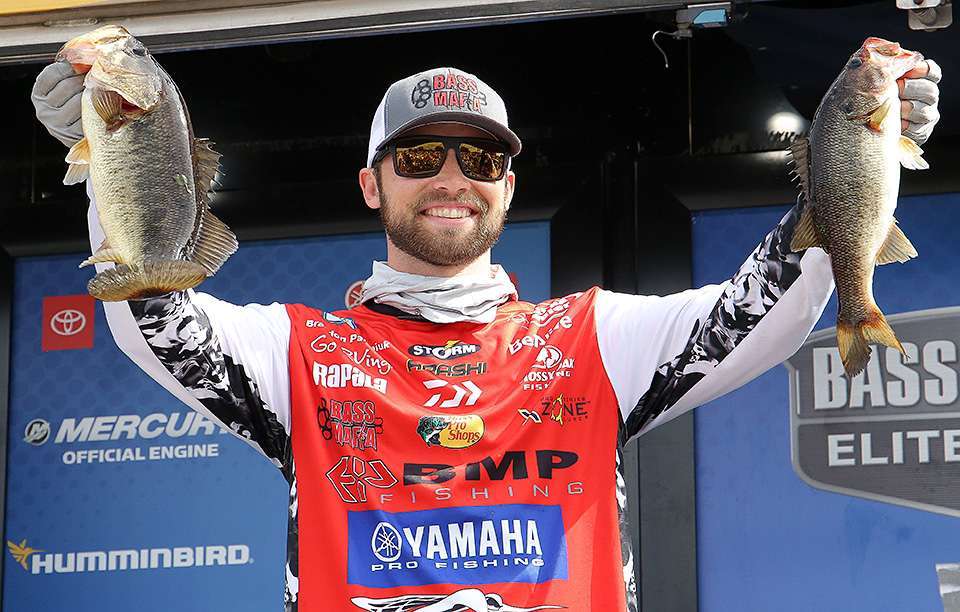
For 2017 Bassmaster Angler of the Year Brandon Palaniuk, a 15th-place finish is nothing to scoff at, but it’s far from exceptional – unless, that is, he earns it in Florida, which is why his 2020 Bassmaster Elite Series opener was so meaningful.
In 101 career Bassmaster tournaments prior to this season, he’d won three times, finished in the top 10 nineteen times and been in the money a solid 68 times, but by comparison, his Florida record was dismal. He’d been to the Sunshine State for 11 tournaments and had never finished better than 37th. That result came in the 2016 tournament on the St. Johns, where he’d previously finished 72nd, 67th and 80th.
If those finishes were out of character, then so too were the triple-digit results he logged at the Harris Chain (2012), Okeechobee (2017) and the Harris Chain again in this year’s first Eastern Open. Those marked half of the six such finishes he’d suffered in total.
Rather than seeing his poor result at the Open on the Harris Chain as a harbinger of things to come, the eternally positive Palaniuk reflected on how the 2017 season-opening bomb on Okeechobee led to that year’s AOY title.
“I don’t know if I would have won AOY if I hadn’t done that poorly at Okeechobee,” he said. “I’d finished 12th in the first tournament of the year on Cherokee, and then I played it too safe in a way. From there on out, I decided to catch as much weight as I can every day. It allowed me to have an awesome season after that.”
Part of the reason that he believes he has historically suffered in Florida is an inability to settle down and fish around other people. “I’ve always tried to get on something and run a pattern,” he said. “If I catch one on a mat, I try to find other mats, but in Florida, you can have the same scenario lined up and it just doesn’t happen. Certain areas hold a lot of fish and then there’s a lot of dead water. Instead of just buckling down, I try to make something happen.”
That year he knew that a large percentage of the fish would be caught offshore, in front of areas where they would eventually spawn, but he “could not bring myself to put the trolling motor down and just do the same thing as everyone else.”
He first burst onto the sport’s biggest stage at the 2011 Bassmaster Classic in New Orleans, where he finished fourth by fishing in a Cataouatche crowd that included eventual winner Kevin VanDam, two-time AOY Aaron Martens, third-place finisher Derek Remitz and several others. He had intended to fish in Bayou Black, with the express intention of “getting away from people,” but when that didn’t pan out in practice, he was left in Cataouatche as his only alternative. “I didn’t know where else to go.”
Subsequent seasons have left him with more knowledge of the various tournament venues, and therefore more options. Indeed, that almost did him in at Palatka this year. He started Day 1 in an area that he knew held fish and had three in the livewell by mid-morning, at which point he “ran 35 to 40 miles to Jacksonville to try to make something happen.” It did not pan out, and he only salvaged his position by returning to his original area, where he sacked a total of 10-05.
“I buckled down,” he recalled. “It turned out that fishing was fairly tough and that weight was better than I expected. I thought I’d be in the 70s, but I ended up in the 30s.” On Day 2 he added 15-06 and moved up to 19th, then stuck with the program through a tough Day 3. Even though he caught only 9-02, his worst weight of the event, he moved up four places.
A big part of that success was recognizing the difficulty factor at play and recognizing what he did and did not have available to him. Also, he acceded to the fact that he’d suffered through previous Florida events and put in extensive research prior to the start of the season.
“I spent a lot of time preparing for that one,” he said. “I watched lots of videos and read lots of articles. I understood the nature of the river and how it had changed recently, which increased my confidence.”
Even with that boosted confidence, he knew that Florida-strain bass living in Florida are the most likely to turn off at the first sign of adverse conditions. That means that it’s “one of those places where you can have fish that can still be there and not bite.” Conditions indicated that Day 3 would be the best one of the truncated tournament, “but it ended up being the toughest day of the entire week.”
If an Okeechobee bomb in the season opener led to an AOY title three years ago, what will the opposite do in 2020?
“I started thinking about the AOY title before the year even started,” Palaniuk said. “That’s something I want to do again. I feel like now I understand when I need to buckle down. Earlier in my career, I’d spend three days of the tournament practicing, still trying to find the winning spot. Now I focus on catching as much as I can every day. Sometimes you don’t find the winning fish and sometimes you can gamble a little bit more.”

